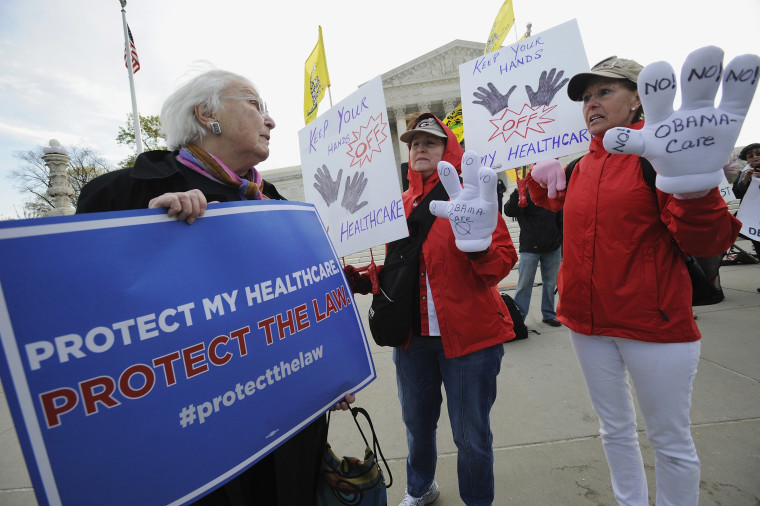In 2009, as Democrats advanced the Affordable Care Act, congressional Republicans promised to produce an alternative plan to prove to the public that the GOP approach was superior. It sounded very nice.
But Republicans, working in secret, missed their own deadline. Then they missed another. Eventually, GOP lawmakers threw together a half-hearted package, which was
a bit of a joke. As Matt Yglesias
noted at the time, the Republican approach to reform sought to create a system that "works better for people who don't need health care services, and much worse for people who actually are sick or who become sick in the future. It's basically a health un-insurance policy." The CBO found that the plan would leave "
about 52 million" Americans without access to basic medical care.
Four-and-a-half years later, we find ourselves in a surprisingly similar situation. For reasons they sometimes struggle to explain, congressional Republicans still hate "Obamacare," and just as importantly, are still working in secret on an alternative reform plan that will prove their superior policymaking skills. One of these days, they keep saying. Just you watch. It'll be **awesome.
Except, of course, the elusive policy is always
just out of reach. It sits at the horizon, but it never draws closer.
Suddenly, a House vote on a Republican alternative to Obamacare seems less likely. Speaker John Boehner (R-Ohio) declined to commit to an alternative measure coming up for a vote this year but said GOP leadership is going to "continue to having conversations with our members" about items like tax reform and replacing President Barack Obama's signature domestic legislation.
And what about the recent promises from House Republican leaders that they will present an ACA alternative -- and vote on it -- sometime in 2014? "We're going to continue to go through a lot of ideas," Boehner said yesterday, using the most non-committal language possible.
By any fair standard, this is quickly becoming a rather ignominious fiasco.
Jon Chait published
a gem this week, highlighting the recent Republican rhetoric.
* On Jan. 30, House Majority Leader Eric Cantor (R-VA.) vowed, "This year, we will rally around an alternative to ObamaCare and pass it on the floor of the House."
* On Feb. 21, Cantor said Republicans are working "to finalize our Obamacare replacement plan."
* On Feb. 24, Cantor's office said it's prepared to "begin" working on the party's alternative.
* On Feb. 27, Boehner said he's prepared to "have conversations" with Republicans about what might be in an alternative policy.
Notice the pattern? Over the course of four weeks, we've gone from a guaranteed vote on an alternative to descending assurances about whether an alternative will ever even exist. Chait explained:
Lots of people treat the Republican Party's inability to unify around an alternative health-care plan, four years after the passage of the Affordable Care Act, as some kind of homework assignment they keep procrastinating on. But the problem isn't that Cantor and Boehner and Ryan would rather lay around on the sofa drinking beer and playing video games than write their health-care plan already. It's that there's no plan out there that is both ideologically acceptable to conservatives and politically defensible.
Quite right. Republicans could present an alternative policy that they love, but it'll quickly be torn to shreds, make the party look foolish, and make clear that the GOP is not to be trusted with health care policy. Indeed, it would very likely scare the American mainstream to be reminded what Republicans would do if the power over the system were in their hands.
On other hand, Republicans could present a half-way credible policy, but it would have to require some regulations and public investments, which necessarily means the party's base would find it abhorrent.
And so we get ... nothing. Years of promises later, the GOP can't meet its own commitment to the public, not because Republicans are lazy, but because it's a post-policy party.
They sure are great at complaining, though, aren't they?
